2021 Update: A excellent review paper (1) examines the role of Creatine in the Development and Activation of Immune Responses. The abstract and link to the full paper are below. The paper is a deep dive into the data that exists on the topic, and speculates on known mechanisms of how creatine may be of benefit to immunity and whom it may benefit and why. The study posted below on creatine in cancer biology is discussed as are others of note in this review paper.
__________________________________________________________________________
Paper added below – Creatine metabolism: energy homeostasis, immunity and cancer biology – is a potentially ground break paper. It’s very dense paper if you can get your hands on a copy and covers in depth creatine as it pertains to immunity, cancer, and fat cell metabolism. One study I posted not long ago looks at the possibility of creatine for potentiating weight loss. Creatine has a long list of potential benefits, and much of that only just being recognized and researched. Yet another potential benefit of creatine is that of an essential immune support supplement via energy for antitumor immunity. While this is a mouse model, there’s no reason to think it does not apply to humans as the cellular mechanisms are essential the same:
“...our results have identified creatine as an important metabolic regulator controlling antitumor T cell immunity, underscoring the potential of creatine supplementation to improve T cell–based cancer immunotherapies.”
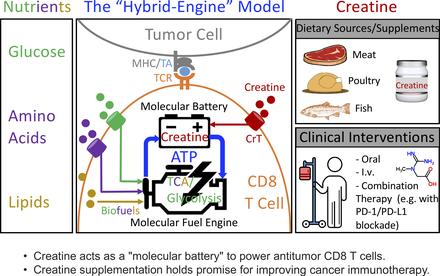
So what does that mean? T cells need large amounts of energy to fight cancer, and it’s known they can suffer what’s called T-cell exhaustion. They literally run out of energy while attempting to fight cancer. As creatine is an essential molecule in energy production for all cells, it also acts as “molecular battery,” wherein stored energy helps these essential immune cells from simply running out of steam to fight on. More data is needed to be sure, but as it has such a long list of known benefits, this may be yet one more. The data also suggests that creatine may improve outcomes for those with cancer being treated via T cell–based cancer immunotherapies. Amazingly, feeding mice the dose of creatine typical of what humans ingest, they demonstrated the mice then had ability to suppress both colon and skin cancer growth. Creatine is of course just one of several key ingredients in my AlphaJoe/Bomb Proof Coffee recipe and continues to demonstrate a wide range of potential benefits, much of which is discussed on this web site as i was one on of the very first people to write about the non athletic/performance benefits in the lay publications.
Creatine uptake regulates CD8 T cell antitumor immunity
Abstract
T cells demand massive energy to combat cancer; however, the metabolic regulators controlling antitumor T cell immunity have just begun to be unveiled. When studying nutrient usage of tumor-infiltrating immune cells in mice, we detected a sharp increase of the expression of a CrT (Slc6a8) gene, which encodes a surface transporter controlling the uptake of creatine into a cell.
Using CrT knockout mice, we showed that creatine uptake deficiency severely impaired antitumor T cell immunity. Supplementing creatine to WT mice significantly suppressed tumor growth in multiple mouse tumor models, and the combination of creatine supplementation with a PD-1/PD-L1 blockade treatment showed synergistic tumor suppression efficacy.
We further demonstrated that creatine acts as a “molecular battery” conserving bioenergy to power T cell activities. Therefore, our results have identified creatine as an important metabolic regulator controlling antitumor T cell immunity, underscoring the potential of creatine supplementation to improve T cell–based cancer immunotherapies.
Full Paper HERE
Creatine metabolism: energy homeostasis, immunity and cancer biology
Abstract
Nature Reviews Endocrinology volume 16, pages421–436(2020)
Perturbations in metabolic processes are associated with diseases such as obesity, type 2 diabetes mellitus, certain infections and some cancers. A resurgence of interest in creatine biology is developing, with new insights into a diverse set of regulatory functions for creatine. This resurgence is primarily driven by technological advances in genetic engineering and metabolism as well as by the realization that this metabolite has key roles in cells beyond the muscle and brain.
Herein, we highlight the latest advances in creatine biology in tissues and cell types that have historically received little attention in the field. In adipose tissue, creatine controls thermogenic respiration and loss of this metabolite impairs whole-body energy expenditure, leading to obesity. We also cover the various roles that creatine metabolism has in cancer cell survival and the function of the immune system. Renewed interest in this area has begun to showcase the therapeutic potential that lies in understanding how changes in creatine metabolism lead to metabolic disease.
Key points
Mitochondria in brown adipose tissue are capable of normal oxidative phosphorylation, with P:O ratios similar to those of other tissues.
Atypical actions of creatine involve phosphocreatine transport into colorectal cancer cells, super-stoichiometric ADP liberation to trigger respiration in thermogenic adipocytes and chromatin remodelling to modulate macrophage polarity.
Cyclocreatine and creatine can both inhibit tumour progression, suggesting that the pro-cancer role of creatine is independent of its function in energy buffering.
The mitochondrial network transduces energy over long distances, thus minimizing the requirement for metabolite diffusion, whereas cells with a disrupted mitochondrial network might buffer energy via the creatine kinase–phosphocreatine circuit.Source: https://www.nature.com/articles/s41574-020-0365-5
(1) The Role of Creatine in the Development and Activation of Immune Responses.Nutrients2021, 13(3), 751
Abstract
The use of dietary supplements has become increasingly common over the past 20 years. Whereas supplements were formerly used mainly by elite athletes, age and fitness status no longer dictates who uses these substances. Indeed, many nutritional supplements are recommended by health care professionals to their patients. Creatine (CR) is a widely used dietary supplement that has been well-studied for its effects on performance and health. CR also aids in recovery from strenuous bouts of exercise by reducing inflammation. Although CR is considered to be very safe in recommended doses, a caveat is that a preponderance of the studies have focused upon young athletic individuals; thus there is limited knowledge regarding the effects of CR on children or the elderly.
In this review, we examine the potential of CR to impact the host outside of the musculoskeletal system, specifically, the immune system, and discuss the available data demonstrating that CR can impact both innate and adaptive immune responses, together with how the effects on the immune system might be exploited to enhance human health.
Full paper HERE.
Will Brink is the owner of the Brinkzone Blog. Will has over 30 years experience as a respected author, columnist and consultant, to the supplement, fitness, bodybuilding, and weight loss industry and has been extensively published. Will graduated from Harvard University with a concentration in the natural sciences, and is a consultant to major supplement, dairy, and pharmaceutical companies.
His often ground breaking articles can be found in publications such as Lets Live, Muscle Media 2000, MuscleMag International, The Life Extension Magazine, Muscle n Fitness, Inside Karate, Exercise For Men Only, Body International, Power, Oxygen, Penthouse, Women’s World and The Townsend Letter For Doctors.
He’s also been published in peer reviewed journals.
Will is the author of the popular e-books, both accompanied by private members forum access , Bodybuilding Revealed & Fat Loss Revealed.
You can also buy Will’s other books on Amazon, Apple iBook, and Barnes and Noble.



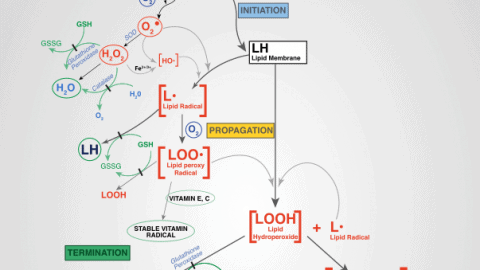
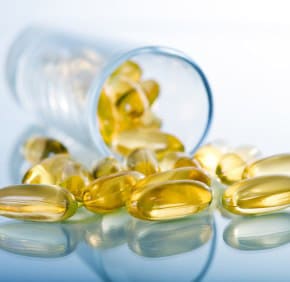

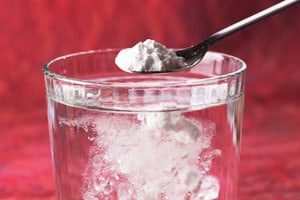
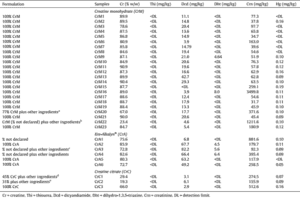

This was a bit over my head. My friend has a Ph.D. and teaches at a local college. I asked him to explain it to me. His reply:
“I spent about 10 minutes with the paper. It borders on junk science. I first wanted to see how they grew CD8 cells in culture. While I believe they actually had CD8 cells as per flow cytometry, I assure you that CD8 cells and all the other immune system cells do not operate without the collaboration of each other, and certainly not on a flat surface (tissue culture flask or wells). To give this type of experimentation meaning, a co-culture of different characterized cells is necessary (my doctoral thesis involve co-culture of retinal endothelial cells and retinal pericytes) and preferably in a 3D format. So, I don’t accept their in vitro experimental model of the immune system as representative of in vivo cell-cell interactions. Second, many of the experiments had small sample sizes (e.g., n =3, n= 8 or 9) with the data expressed as x +/- standard error of the mean (SEM). Data should be expressed as the standard deviation (SD)-explanation too complex for email. While the statistical tests used are appropriate (ANOVA for three or more group comparisons; t-test for two group comparisons) I know from experience that the sample sizes plus the large variability in the data are unlikely to calculate to statistical significance. Finally, I wonder how much money the primary investigator Lili Yang was paid by the supplement industry to conduct this study-we will never know short of a joint CIA-FBI investigation. This paper is an example as to why there have been no significant advances in the understanding of the mechanisms that drive cancer beyond cell cycle dysfunction.
The in vitro lab stuff on CD8 cells in culture is above my pay grade to say if it was applicable or not, but it sounds like he knows what he’s talking about. Note they did also find that effect in the in vivo model, and note also I was very clear to say more data is needed. These are at best preliminary findings which is why until studies are reproduced and or followed up on, is never viewed as established science. Still interesting in my view and creatine appears to have a wide range of potential benefits, lets hope that’s yet another one…
I have a Micro degree, but am having trouble understanding the total concepts written here. My question would be personal, I have RA, take an immune suppressant, but also take a nightly dose of LDN. (my rheumatologist believes though it seems I am putting a positive and a negative into my system, that there are health benefits to the combination). My CRP is excellent (usually about 0.5-1) but, my Creatinine blood levels are between 1.5 – 1.78, no S&S of CKF or CKD yet, does this study suggest the extra levels of Cre will keep my cancer risks lower?
Specific to cancer risks, it’s unclear. It stands to reason that a healthy immune system is more likley to prevent cancer, and creatine appears to assist the immune system and the full paper does show some animal studies where feeding then creatine made them more resistant so some cancers, but definitive conclusions are not there yet. Hence why the title asks the Q vs claims it’s solid findings. Creatine has so many benefits it’s a no brianer for most people in my view. This may be yet another benefit. As far as RA, LEF has some good protocols on most diseased: https://www.lifeextension.com/protocols/immune-connective-joint/rheumatoid-arthritis
Great information. As a 73-year young fitness player, this was especially informative. Thanks.
Thanks for the info Will.
So for me I have been taking Life Extension Mix for years and I normally do not take the 9 tablets throughout the day (As the directions may indicate) as I feel that is too much vitamins…etc. But with this Covid going on I have been taking a good 4 to 5 per day which had a load of vitamin D, C Zinc…etc. I know you are very familiar with Life Extension.
Also I do weight training and take ON Whey protein a few times a day.
Lastly I have been taking Creatine Monohydrate (Creapure) for the past year or so.
So after reading this….it sounds at least I am doing some good things to hopefully support a strong immune system if I do get exposed to this virus.
Always enjoy your stuff my man!!
Creatine the only supplement in the jungle worth a rats ass
Hi Will, sorry I tried posting this multiple times in the appropriate article but it wasnt going throught. I was looking to buy more cocoa powder online for BPC but customer reviews on amazon kept mentioning cadmium and lead levels listed on consumerlab.com’s report, last updated Dec. 2019. Is this a nonconcern if consumed in the half teaspoon dose as in the how to make video?
thanks for the awesome recipe, look forward to it every morning
That’s something I’m still looking into. I concerned, perhaps use brands listed via consumerlab has having low/no heavy metals. I believe most tested below FDA accepted levels but no CA, but think CA has gone way over the top with their levels on most things. I do wanna get my heavy metals tested some day to see if there’s any issues there as we are exposed to them via various routes all the time.
thanks Will, I don’t have access to the report but someone who does commented the Ghirardelli brand was rated the best with the lowest metal levels but also had the lowest antioxident levels. that’s the one I’ve been using since your first BPC vid
I read that report a while I had (short) access to it. As I clearly recall, good old Hersey unsweetened cocoa powder passed the heavy metal tests. That’s what I use, and never looked back.
always great to great stuff from you will iam 89 and still going strong, only one thing i miss my bro don ross, & dan duchane, my work out bros, your alpha joe coffee is great, good menteal focoss, thanks again will.
will great stuff, your alphajoe coffee is great, im 89 and still going strong, thanks for your products, there should be more people like you in this world.
Glad you are enjoying the Alpha Joe!